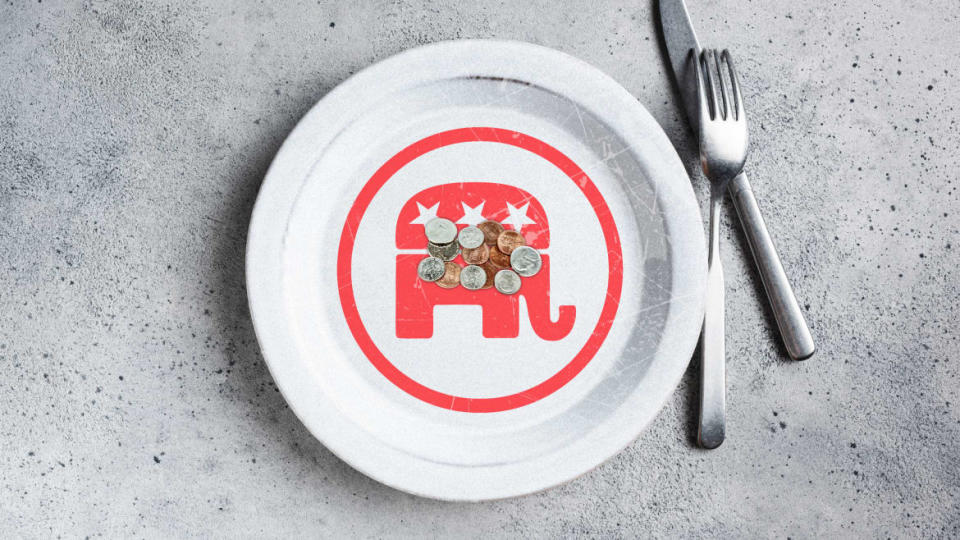The GOP Hates the Social Safety Net, but Their Voters Need It

In singling out federal programs for the deepest cuts during the haggling over raising the debt ceiling, the GOP is tapping into the myth that those who rely on public assistance are undeserving and can’t be trusted to responsibly receive government benefits.
It goes back to President Ronald Reagan’s elevating and exaggerating an anecdotal “welfare queen” who drew checks from multiple agencies and spent the money on luxury food and drink. Democrats recoiled from the characterization, rightly so, this was belittling lower income people, who were the Democrats’ base.
What’s different today is that a lot more of the people depending on government assistance vote Republican. They work low-income jobs, and they’re the ones who will be hurt by the deal the GOP wants. “You can’t have the kind of cuts the Republicans are talking about without hurting people, and a lot of those people are going to be Republicans,” says Jack Pitney, Professor of American Politics at Claremont McKenna College.
How a Boston Lawsuit Could Get Us Out of the Debt Ceiling Mess
Just as there were Reagan Democrats, voters wooed by the movie star president’s conservatism to the GOP, there are Trump Republicans, blue collar workers who blame Democratic elites for leaving them behind and are fiercely loyal to Donald Trump for championing their biases along with their interests.
“They’re (Republicans) playing to a common misconception that ‘welfare’ goes mostly to people who are lazy… for the most part, it’s a myth,” says Pitney, citing another myth underlying the Republican position “that you can make massive cuts in federal spending without hurting anyone because it’s all waste, fraud, and abuse,” a phrase popularized by Reagan.
“The myth of the welfare queen is alive and well, unfortunately, and I don’t think Americans understand how much welfare programs have changed over the last 30 years,” says Mariam Rashid, Associate Director of Racial Equity and Justice at the Center for American Progress. States have autonomy on how and what the money is being spent on, and stringent work requirements are already in place.
Individuals between the age of 18 and 49 who don’t have children at home are barred from SNAP (Supplemental Nutrition Assistance Program) unless they get an exemption. Republicans want to expand that policy to include people up to age 55. Proposed cuts to the Medicaid program would unfairly target people with disabilities, the elderly, and people who are already living on the precipice.
It’s easy for politicians in Washington to say people should pick up another shift when they have no idea how complicated that is for jobs that don’t pay enough to get off food stamps.
Gerald Ford’s Pardon of Nixon Is Why Donald Trump Can Still Run for President
The proposed GOP cuts in social welfare programs, if enacted, would change little in the broader budget picture while having an enormous impact on the lives of the most vulnerable, who already struggle with childcare, the lack of reliable transportation, jobs with minimal pay, and uneven schedules.
“It is the central fallacy of the Republican budget cutters that you can cut your way to balance at all without touching defense and entitlements,” says Matt Bennett, co-founder of Third Way, a centrist Democratic group. Speaker McCarthy and the House GOP would have voters believe the federal government has plenty of money, it’s just going to the wrong places. “When you’re the anti-government party and you’ve spent half a century making the case that government is the problem, it’s an easy message,” says Bennett.
Reagan famously said, “The nine most terrifying words in the English language are: I'm from the Government, and I'm here to help.” He set the tone for a Republican Party to clothe a miserly attitude toward the poor and downtrodden with lofty rhetoric about personal responsibility and individuality.
At the end of his eight years as president, after failing to balance the budget as promised, Reagan happily declared, “The deficit is big enough to take care of itself.” Vice President Dick Cheney said in 2002, “Deficits don’t matter,” after President George W. Bush put tax breaks, two wars, Medicare expansion, and a Wall Street bailout on the nation’s credit card.
Turns out deficits only matter to Republicans when there’s a Democrat in the White House. Republicans are adept at taking advantage of the public’s lack of knowledge about government spending. “Voters think 25 percent or more of the budget goes to foreign aid, and much of the rest goes to lazy people, and it’s just not true,” says Pitney, who worked on the Republican side of politics before he became an academic.
Elon Musk, Joe Rogan, and the Apocalyptic ‘Centrists’
Asked if House Republicans understand the damage they will inflict on their own voters if they stay on the path they’re on, Pitney says, “A couple of the smarter ones understand that perfectly well, and they’re assuming it’s not going to happen (the cuts they’re proposing). But there are a lot of people, like Jim Jordan, who believe what they’re peddling.”
A founder and the first chairperson of the Freedom Caucus, Jordan is among the House members pressuring Speaker McCarthy to hold the line even if it means default. In a GOP caucus divided among true believers, cynics, and performance artists all poised to oust their leader should he deviate, McCarthy’s priority is to keep his job even if it means hurting his party’s voters, and the country.
“He’s like a kid who just got a luxury car and doesn’t know how to drive it,” says Pitney, as the government braces for a last minute swerve to save the day.
Get the Daily Beast's biggest scoops and scandals delivered right to your inbox. Sign up now.
Stay informed and gain unlimited access to the Daily Beast's unmatched reporting. Subscribe now.

 Yahoo Sports
Yahoo Sports 